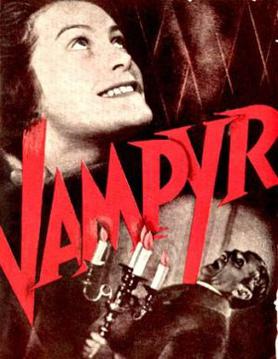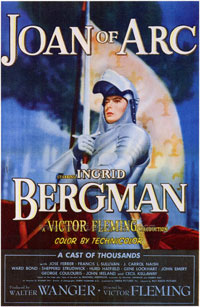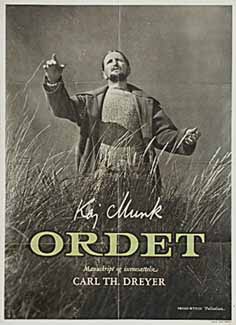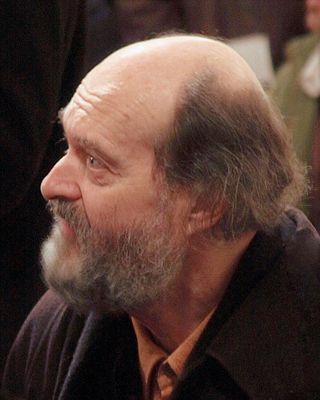
In music, monophony is the simplest of musical textures, consisting of a melody, typically sung by a single singer or played by a single instrument player without accompanying harmony or chords. Many folk songs and traditional songs are monophonic. A melody is also considered to be monophonic if a group of singers sings the same melody together at the unison or with the same melody notes duplicated at the octave. If an entire melody is played by two or more instruments or sung by a choir with a fixed interval, such as a perfect fifth, it is also said to be monophony. The musical texture of a song or musical piece is determined by assessing whether varying components are used, such as an accompaniment part or polyphonic melody lines.

The Passion of Joan of Arc is a 1928 French silent historical film based on the actual record of the trial of Joan of Arc. The film was directed by Carl Theodor Dreyer and stars Renée Jeanne Falconetti as Joan. It is widely regarded as a landmark of cinema, especially for its production, Dreyer's direction and Falconetti's performance, which is often listed as one of the finest in cinema history. The film summarizes the time that Joan of Arc was a captive of England, depicting her trial and execution.

Carl Theodor Dreyer, commonly known as Carl Th. Dreyer, was a Danish film director and screenwriter. Widely considered one of the greatest filmmakers of all time, his movies are noted for emotional austerity and slow, stately pacing, frequent themes of social intolerance, the inseparability of fate and death, and the power of evil in earthly life.

Vampyr is a 1932 gothic horror film directed by Danish director Carl Theodor Dreyer. The film was written by Dreyer and Christen Jul based on elements from J. Sheridan Le Fanu's 1872 collection of supernatural stories In a Glass Darkly. Vampyr was funded by Nicolas de Gunzburg who starred in the film under the name of Julian West among a mostly non-professional cast. Gunzburg plays the role of Allan Gray, a student of the occult who enters the village of Courtempierre, which is under the curse of a vampire.

Renée Jeanne Falconetti, sometimes credited as Maria Falconetti, Marie Falconetti, Renée Maria Falconetti, or simply Falconetti, was a French stage and film actress, notable for her acclaimed role as Joan of Arc in Carl Theodor Dreyer's 1928 silent The Passion of Joan of Arc and subsequent mysterious and enigmatic death. There is little recorded information about her life and career on the internet, and much of the existing information about her life is contradictory.

Joan of Arc is a 1948 American hagiographic epic film directed by Victor Fleming, and starring Ingrid Bergman as the eponymous French religious icon and war heroine. It was produced by Walter Wanger and is based on Maxwell Anderson's successful Broadway play Joan of Lorraine, which also starred Bergman, and was adapted for the screen by Anderson himself, in collaboration with Andrew Solt. It is the only film of an Anderson play for which the author wrote the film script. It is the last film Fleming directed before his death in 1949.
French classical music began with the sacred music of the Roman Catholic Church, with written records predating the reign of Charlemagne. It includes all of the major genres of sacred and secular, instrumental and vocal music. French classical styles often have an identifiably national character, ranging from the clarity and precision of the music of the late Renaissance music to the sensitive and emotional Impressionistic styles of the early 20th century. Important French composers include Pérotin, Machaut, Du Fay, Ockeghem, Josquin, Lully, Charpentier, Couperin, Rameau, Leclair, Grétry, Méhul, Auber, Berlioz, Alkan, Gounod, Offenbach, Franck, Lalo, Saint-Saëns, Delibes, Bizet, Chabrier, Massenet, Widor, Fauré, d'Indy, Chausson, Debussy, Dukas, Vierne, Duruflé, Satie, Roussel, Hahn, Ravel, Honegger, Milhaud, Poulenc, Auric, Messiaen, Françaix, Dupré, Dutilleux, Xenakis, Boulez, Guillou, Grisey, and Murail.

Ordet, is a 1955 Danish drama film,written and directed by Carl Theodor Dreyer. It is based on a play by Kaj Munk, a Danish Lutheran priest, first performed in 1932. The film won the Golden Lion at the 16th Venice International Film Festival, and was the only film by Dreyer to be both a critical and financial success.
Richard Einhorn is an American composer of contemporary classical music.

The Trial of Joan of Arc is a 1962 French historical drama film written and directed by Robert Bresson. Florence Delay stars as Joan of Arc, a French military leader, who is undergoing a trial on the charge of heresy in 1431, during the Hundred Years' War.

Sir Edward Elgar's Introduction and Allegro for Strings, Op. 47, was composed in 1905 for performance in an all-Elgar concert by the newly formed London Symphony Orchestra. Scored for string quartet and string orchestra, Elgar composed it to show off the players' virtuosity. Though initial critical reception was lukewarm at best, the score soon came to be recognized as a masterpiece. The work, which is roughly twelve to fourteen minutes in length, is like a multi-layered symphonic poem for string orchestra, with several prominent themes.
Bronius Kutavičius was a Lithuanian composer and academic composition teacher. He wrote numerous oratorios and operas, often inspired by ancient Lithuanian polytheistic beliefs and music. He also composed film scores, orchestral works and chamber music. Kutavičius is regarded as a symbol of Lithuanian cultural identity, both in music and in politics. Among many awards, he received the Lithuanian State Prize in 1987.
Đuro Živković, also rendered as Djuro Zivkovic, is a Serbian-Swedish composer and violinist. He has lived in Stockholm, Sweden, since 2000.
Hanna Kulenty is a Polish composer of contemporary classical music. Since 1992, she has worked and lived both in Warsaw (Poland) and in Arnhem (Netherlands).
David Hattner is an American professional clarinetist and conductor currently serving as music director of the Portland Youth Philharmonic. Raised in Toledo, Ohio, Hattner attended the Interlochen Arts Camp and Arts Academy, experiences which inspired him to become a professional musician and conductor. He graduated from the Arts Academy in 1986 and enrolled in Northwestern University where he studied clarinet performance under Robert Marcellus. In 1988 he placed second in the International Clarinet Association's Young Artist Competition and was selected to join the American-Soviet Youth Orchestra. He earned a music degree with honors in 1990.

The Missa Brevis by Leonard Bernstein is a musical setting of parts of the mass ordinary in Latin for a mixed a cappella choir with countertenor solo and percussion. It is also Bernstein's last complete choral work, due to his death a year after its completion in 1989.

Hélène Breschand is a French harpist, composer and improviser. Breschand leads a career both as a solo artist as well as in ensemble work, playing both a contemporary repertoire and premiering new works as much as she plays improvised music and musical theater. She is a musician who plays on the verge of several genres ranging from contemporary music to jazz. She plays both written and improvised music.

Arvo Pärt composed his Third Symphony in 1971. It is scored for symphony orchestra and was dedicated to Neeme Järvi.

The Requiem by the Hungarian composer György Ligeti is a large-scale choral and orchestral composition, composed between 1963 and 1965.












